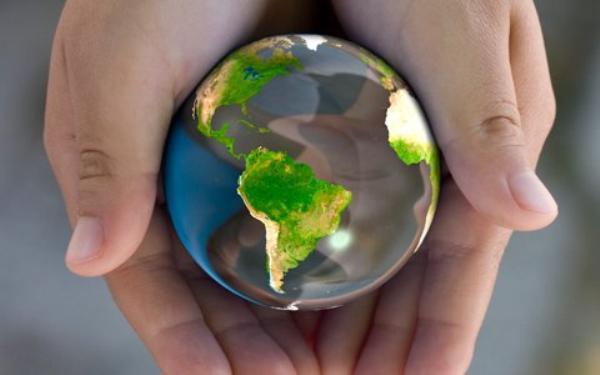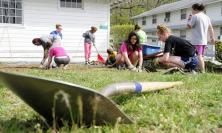Why do we sometimes find it difficult to display humility and responsibility in our relationship with the rest of the natural world? Helen Freeman traces the history of Jewish thought on this issue, and advocates that a deeper understanding of consumerism and the need for rootedness and security will help us to see our relationship to the created world in a new light.
For Jews, our understanding of engagement with the created world goes right back to the creation story in Genesis chapter one. Once the beautiful world and its life forms have been created, God says, in verse 26:
’vayomer Elohim, na’aseh adam b’tzalmaynoo kidmootaynoo u-rdu vidgut hayam, oov’of hashamayim, oovab’haymah oov’khol ha-aretz oov’khol harems haromays al ha-aretz-
And God said, let us make Adam in our image and likeness, and he will rule over the fish of the sea and the birds of the heaven and the cattle and all the earth and all creeping things that creep upon the earth.
The word for human being, adam, is related closely to the word for earth, adamah, and conveys the earthiness and closeness of the relationship between human beings and the soil of the ground.
The later rabbinical commentators understood the human right to rule over the other creatures to be an ethical imperative; if they did not do so justly, then terrible things would happen. Using a play on the word ’u-rdu – and rule – the fifth-century midrash in Genesis Rabbah 8:12 says this:
‘And have dominion (u-rdu) over the fish of the sea etc.’ Rabbi Chanina said: If humanity merits it, u-rdu (it will have dominion); and if humanity doesn’t merit it yirdu (it will descend/fall). Rabbi Ya’akov of Kfar Hanan: That which is ‘in our image, according to our likeness’, u-rdu (it will have dominion), and that which is not in our image according to our likeness yirdu (it will descend).[1]
The challenge to humanity is then how we conceptualise our place of dominion over the created world. The difficult verse is Genesis 1:28, just after the creation of human beings which says
vayivarkh otam elohim, vayomer lahem elohim p-ru ur-vu umiloo et ha-aretz v-khivshooha ur-du vidgat hayam oov’of hashamayim oov’khol khayah haromeset al ha-aretz-
And God blessed them and said to them: be fruitful and multiply and fill the earth and subdue it, and you will rule over the fish of the sea and the birds of the heaven and all living things that swarm upon the earth.
The complexity is in understanding the ramifications of the word v’khivshooha – and subdue it. The Hebrew root means to press down, or dominate, and might be seen as giving human beings carte blanche to do as they will with the created world. So the rabbis came up with a midrashic interpretation that made it clear that human beings had to have humility in their relationship to the created world. In Ecclesiastes Rabbah 7:13 it says:
When the Holy One, blessed be He, created the first Adam, God took Adam and led him around all the trees of the Garden of Eden. And God said to Adam: Look at my works! How beautiful and praiseworthy they are! And everything that I made, I created it for you. Be careful though, that you don’t spoil or destroy My world – because if you spoil it, there’s nobody after you to fix it.[2]
This midrash clearly puts humanity in our place as caretakers for God’s world; the problem is bringing this principle into practice. In Judaism this is done by the medium of halachah, a word often translated as Jewish law, but meaning originally the ‘right path in which to go.’ The clearest halachah application of the requirement to cherish God’s law is based on Deuteronomy 20:19 when we are forbidden to wantonly cut down fruit-bearing trees even during wartime. From that, a halachic principle was derived called bal taschit – a prohibition against waste. The areas in which this was applied was extended during the Talmudic period so, for example we read in tractate Shabbat 67b:
Whoever covers an oil lamp or uncovers a naphtha lamp transgresses against the law of bal taschit.
These two actions, it turns out, cause the lamp to burn less efficiently; thus necessitating the use of more fuel than necessary. Furthermore we are forbidden to dump our well water when another might need it (B Yevamot 11b) and are told on occasion to choose those foods which require the fewest resources to make – barley bread over wheat bread (B Shabbat 140a)
By medieval times, in Spain Sefer Hahinuch, the book of education, is offering a more global view of conservation in around the year 1300:
Righteous people of good deeds do not waste in this world even a mustard seed, they become sorrowful with every wasteful and destructive act that they see and if they can, they use all their strength to save everything possible from destruction. But the wicked are not thus; they are like demons. They rejoice in the destruction of the world just as they destroy themselves.[3]
Generally speaking, the rabbis forbade all destructive acts, and they linked one who destroys anything in anger to one who worships idols.
In nineteenth-century Germany, Samson Raphael Hirsch, a modern orthodox rabbi who was known for combining Torah im derech eretz, Jewish tradition with courtesy to others, wrote in his book Horeb:
‘Do not destroy anything’. the first and most general call of God Which comes to you, man, when you realise yourself as a master of the Earth… God’s call proclaims to you… ‘If you destroy, if you ruin – At that moment you are not a man, you are an animal, and have no Right to the things around you. I lent them to you for wise use only; Never forget that I lent them to you. As soon as you use them Unwisely, be it the greatest or the smallest, you commit treachery Against My world, you commit murder and robbery against My Property, you sin against Me!’ This is what God calls unto you, And with this call does He represent the greatest and smallest Against you and grants the smallest, as also the greatest, a right Against your presumptuousness.[4]
In an enormous extension of the original law of bal taschit Hirsch says that even those who hoard property and do nothing with it, rather than using it wisely, are against the halachah. The difficulty we have in modern times is how to dovetail this profound religious sensibility about the beauty of our world and its fragility, with a secular environment that insists more is better, and more and more and more is better still.
As far back as the eleventh century, religious philosophers such as Jonah Ibn Janah of Saragossa were trying to heighten human sensitivity to the fact that all belongs to God and we human beings have it only on loan:
A man is held responsible for everything he receives in this world, and his children are responsible too. The fact is nothing belongs to him, everything is the Lord’s, and whatever he received he received on credit and the Lord will exact payment for it. This may be compared to a person who entered a city and found no one there. He walked into a house and found a table set with all kinds of food and drink. So he began to eat and drink thinking, ‘I deserve all of this, all of it is mine, I shall do with it what I please!’ He didn’t even notice that the owners were watching him from the side! He will yet have to pay for everything he ate and drank, for he is in a spot from which he will not be able to escape.[5]
The urgent question is, how do we increase our sensitivity to the spot that we are in so that we can join together to provide a transformative initiative? A midrash in Leviticus Rabbah, 4:6 written about 1,500 years ago addresses this very concern. Rabbi Shimon bar Yochai taught that we are like a group of people in a boat: one man started to drill under his seat, and when the others intervened to protest, he said: ‘What concern is it of yours, I am only drilling under my own seat.’ They said: ‘The water will rise and cover us all.’
This midrash addresses an image similar to those in which all of the Jewish people are compared to scattered sheep, or when one limb is damaged, the whole entity is in pain. In a globalised society, we might apply the same image to the whole of humanity; when one part is hurt – through the Amazon rain forests being destroyed, for example – we cannot say: you are only destroying your own back yard; it will have a devastating impact on all of humanity. The urgency of the task of bringing together the ethical and moral imperatives with the practical realities of modern life is perhaps best expressed by Al Gore, who won a Nobel Prize for his urgent commitment to developing ecological awareness…
Today, we enthusiastically participate in what is in essence a massive and unprecedented experiment with the natural systems of the global environment, with little regard for the moral consequences. But for the separation of science and religion, we might not be pumping so much gaseous chemical waste into the atmosphere and threatening the destruction of the earth’s climate balance. But for the separation of useful technological know-how and the moral judgments to guide its use, we might not be slashing and burning one football field’s worth of rainforest every second. But for the assumed separation of humankind from nature, we might not be destroying half the living species on earth in the space of a single lifetime. But for the separation of living and feeling, we might not tolerate the deaths every day of 37,000 children under the age of five from starvation and preventable diseases made worse by failures of crops and politics. But we do tolerate – and collectively perpetuate – all these things. They are going on right now. When future generations wonder how we could go along with our daily routines in silent complicity with the collective destruction of the earth, will we… claim that we did not notice these things because we were morally asleep? Or will we try to explain that we were not so much asleep as living in a waking trance… under whose influence we felt no connection between our routine, banal acts and the moral consequences of what we did, as long as they were far away at the other end of the massive machine of civilization? Modern philosophy has gone so far in its absurd pretensions about the separateness of human beings from nature as to ask the famous question: ‘If a tree falls in the forest and no person is there to hear it, does it make a sound?’ If robotic chain saws finally destroy all the rainforests on earth, and if the people who set them in motion are far enough away so that they don’t hear the crash of the trees on the naked forest floor, does it matter? This rational, detached, scientific intellect, observing a world of which it is no longer a part, is too often arrogant, unfeeling, uncaring. And its consequences can be monstrous.[6]
The problem with the enormity of the questions set by Al Gore and by the religious traditions is that they are so profound, so frightening and life changing that we are tempted to run away and hide. Such an understandable instinct explains the popularity of Channel 4’s documentary, The Great Global Warming Swindle, broadcast in March 2007, which attempted to show that global warming was unproven science. When human beings feel insecure, we want to hold onto what we know, to reassure ourselves that our present way of functioning is long lasting. It is no surprise, then, that shopping has become a sort of national sport. If life feels uncertain, the very planet is at risk, then we begin to feel empty inside and try to force down that uncomfortable feeling with materialism. G.K. Chesterton said that when we stop believing in God, what happens is not that we believe in nothing; it is that we believe in anything. The national religion now seems to be consumerism: that new car, that cheap sofa, that marvelous trip abroad on the budget airline. But in a time of global financial insecurity even that safe haven where we could fill an inner emptiness with possessions is beginning to feel less secure.
That feeling of uncertainty, of having to express our spiritual needs by a rootedness in material possessions, can sometimes be a particular trap for minority communities, who are more vulnerable to the insecurity of rootlessness. So, Jewish families who celebrate their child’s bar mitzvah or wedding in a very materialistic fashion are doing much more than showing off their affluence. They are celebrating a sense of security, that they, as the grandchildren or great grandchildren of penniless refugees feel a renewed connection to the earth of the place in which they live. Paradoxically, this sort of rather frantic consumerism is an unconscious attempt to reconnect the connection between Adam and Adamah, between an individual human being and the land on which he or she is living. It is a concretising of a symbolic need, in the same way that a person seeking after spirit can sometimes first find it in a bottle. A person who is struggling with a sense of purposelessness can counter their awareness of living in a dangerous world by surrounding themselves with beautiful and expensive possessions.
Yet, fifty years ago, Rabbi Abraham Joshua Heschel was questioning the definition of human beings as those who are able to acquire and consume, and the utilization of resources as the reason God put us into this world:
In the history of civilization different aspects of nature have drawn forth the talent of humanity; sometimes its power, sometimes its beauty and occasionally its grandeur have attracted our mind. Our age is one in which usefulness is thought to be the chief merit of nature; in which the attainment of power, the utilization of its resources is taken to be the chief purpose of humanity in God’s creation. The modern man learns in order to use. […] We do not know any more how to justify any value except in terms of expediency. We are willing to define ourselves as ‘a seeker after the maximum degree of comfort for the minimum expenditure of energy.’ We equate value with that which avails. We feel, act and think as if the sole purpose of the universe were to satisfy our needs… We have supreme faith in statistics and abhor the idea of a mystery. Obstinately we ignore the fact that we are all surrounded by things which we apprehend but cannot comprehend; that even reason is a mystery to itself. We are sure of our ability to explain all mystery away… Dazzled by the brilliant achievements of the intellect in science and technique we have not only become convinced that we are the masters of the earth; we have become convinced that our needs and interests are the ultimate standard of what is right and wrong. Comfort, luxuries, success continually bait our appetites, impairing our vision of that which is required but not always desired. They make it easy for us to grow blind to values.[7]
Religious traditions can remind us of the sense of humility about humanity and our place in creation. There is a higher standard of what is right and wrong than our own selfish needs. Fulfilling our desire for security can lead to an absolute insensitivity to the destruction of precious habitats, biodiversity and climate. We did not create life on this planet, but we are more than able to destroy it.
Judaism, Christianity and Islam are all founded on traditions that encourage a sense of respect and awe for the created world, an awareness of our own limitations and a relationship with God that sensitises us to the world around us. Our communities can open the possibilities of seeing the world as a place for performing good deeds to build towards a messianic age when we feel rooted and secure in a world of balance. The model for what we might call ‘ecological commandments’ goes back to rabbinic times when , for example, there was legislation forbidding the location of a kiln within the city borders of Jerusalem to avoid smoke pollution (Baba Kamma 82b) There are also positive commandments such as the requirement for all cities to have greenery in order to be suitable habitation for scholars (Eruvin 55b) The need to plan for our descendants is exemplified by a story about Honi the circle maker, one of the heroes of rabbinic literature.
One day Honi was walking down the road, and he saw a man planting a carob tree. Honi said to him: ‘Since the carob doesn’t bear fruit for seventy years, are you so sure that you’ll live seventy years and eat from it?!’ The man replied: ‘I found a world that was full of carob trees. Just like my ancestors planted for me, so I plant for my descendants’.[8]
Rabbi Helen Freeman was ordained by Leo Baeck College in 1990, since when she has served the Liberal Jewish Synagogue and the West London Synagogue of British Jews. She has qualified as a Jungian analyst and is developing the concept of Jewish healing.
This article is part of a series, Faiths in Creation, published earlier this year by the Heythrop Institute for Religion, Ethics and Public Life,IBN 978-1-905566-07-5. It is available as a booklet from HIREPL, Heythrop College, Kensington Square, London W8 5HQ, at £4 per copy.
[1] Midrash Rabbah, Vilna edition, p. 29.
[2] Midrash Rabbah, Vilna Edition, megillot section p. 20ff.
[3] Quoted in Torah of the Earth, ed. Waskow, (Jewish Lights, 2000).
[4] Horeb: A philosophy of Jewish Laws and Observances, (New York, Soncino Press 1981) pp. 279–280.
[5] The Living Talmud (New York, Mentor, 1957).
[6] Gore, A., Earth in the Balance – Ecology and the Human Spirit, (New York, Rodale Press, 2006) p. 265.
[7] Heschel, A.J., God in Search of Man, (New York, Farrer Straus and Giroux 1959) pp. 33–35.
[8] Babylonian Talmud Ta’anit, 23a.






